Blood Swept Lands: Battlefield 1 and The First World War
By gamer_152 10 Comments
Note: The following article contains major spoilers for Battlefield 1 and Halo: Reach.
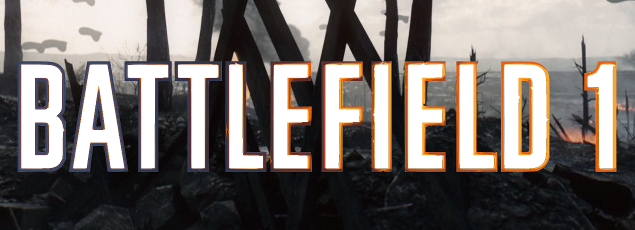
During World War I, the United Kingdom lost almost 800,000 men on the battlefield, many of them little older than boys, and that was just a sliver of the total killings. Between direct casualties, civilians who starved or died of disease under rationing, the Armenian genocide, and other fatalities, 16.5 million died in the war. Almost 50 million more died from 1918-1919 in the epidemic of Spanish Flu spread via the bodies of soldiers travelling the globe. Those who lived were left with hellish memories and often even trauma, with 70 million personnel worldwide seeing combat. Yet, when the 100th anniversary of the war rolled around, Britain found itself in the unusual position of not remembering this conflict with the stark clarity you'd expect given the number of headstones at the end of it. 70 million people were disappearing into a memory hole.
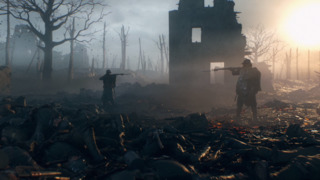
The majority of the UK population don't spend their time wandering down the corridors of history, and in education, media, and memorials, World War I had become overshadowed by World War II. Think about how many WWI films there are in comparison to WWII films or how much you learned about each in school. One reason for this collective fog around The Great War is that it ended twenty-one years before the Second World War started. By 2014, no one from the First World War was alive, while a number of people from the Second World War still were. Of those that had died in the latter conflict, their deaths were more recent. Not only were there more veterans around with first-hand accounts of the Second World War, but as that tragedy was closer to us on history's timeline, it had a more direct impact on modern politics, and so, we often treated it as more relevant.
For creators of video games and action films, the above motivation and a couple of others shepherded them away from WWI and towards its older brother. WWII had more evolved firearms and tanks which could make for more seismic action scenes, and in video games, wouldn't jam in the player's hands or stall the pace of a battle. It was also less of a challenge to write a sense of purpose into World War II scenes. The prime movers of World War I are not easily explained or emotionally invested in; they're domino chains of alliances and enmities spread across 20th century Europe, few of which are going to have personal meaning to anyone today. But in WWII, we can all get behind the military's intention of defeating a clearly-defined evil: Nazis. Of course, the aims of the war were more complex than the allies wanting to stop genocidal imperialists. Still, the event lends itself to being presented as a good vs. evil showdown as opposed to the almost bureaucratic exercise of the First World War. Video games, in particular, have traditionally looked for enemies that users will identify as foes on-sight and can kill guilt-free. Nazis fit neatly into that role.
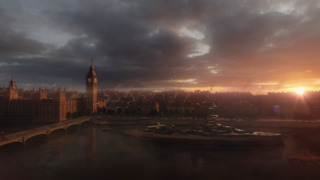
At the centenary, the 100 year anniversary of WWI, the British government attempted to resurface memories of the fast-fading tragedy. They had pledged tens of millions to the remembrance of the war and its combatants. Media had a weighty responsibility in this memorialising. It had to make the public internalise the suffering of an international massacre in a way that they were not currently doing. Its duty was to realise and detail a forgotten sacrifice of millions and give a voice to millions more who lost their children and partners to the carnage. The BBC, for their part, produced 2,500 hours of TV, film, and radio on the topic. Outside the Tower of London, an art installation represented every British and colonial serviceman taken in WWI with a ceramic poppy, and perhaps the most famous filmic contribution to the anniversary was Peter Jackson's They Shall Not Grow Old. Jackson's editors took nearly 100 hours of World War I footage, cut it down, colourised it, and accompanied it with readings of letters from the soldiers. So, what did the games industry give? During the 2014-2018 period, three prominent games dealt with the conflict.
The first of these was Ubisoft's Valiant Hearts: The Great War in 2014. It was an adventure game that sometimes cartoonified a grisly, depressing event, but it put aside plenty of time to give a human voice to the characters and show that people on the front lines were connected to loved ones back home. It was laden with educational text and needless to say, it does not end happily. Ubisoft also inserted some missions set in World War I into 2015's Assassin's Creed Syndicate. In them, we swat away blitz planes, sabotage German spies terrorising London, and get to meet Winston Churchill. The level is about satisfying play rather than commemoration; it takes opportunities to empathise with war victims and instead makes them about your reflexes and smarts. That being said, it doesn't feel like there's a moment where it trivialises the deaths of anyone.
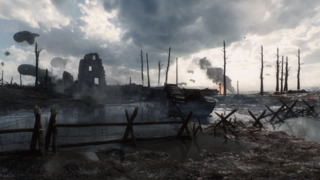
But Valiant Hearts had a modest audience, and the wartime missions in Syndicate comprise a single family of sidequests. There was only one mainstream game solely dedicated to the war, and it was 2016's Battlefield 1, a full-length triple AAA game inviting players to relive the bloodshed of the 1910s. It's a title that reminds us of the forgotten theatres and evolving armaments of the conflict, but unfortunately, also fetishises and glorifies it. When EA revealed the game, they did so in a smash cut trailer of all the most searing gunfire and explosion they had on hand and varnished it with a warbling club remix of Seven Nation Army. When DICE General Manager, Patrick Bach, described the title at E3 2016, he talked only about how destructible the environment was and how formidable the vehicles. He touted the game with the phrase "All-out war has never felt so epic". Following the conference, a multiplayer match of the game was commentated over as an exciting sport rather than a real, historical event where men saw their friends die gruesomely in front of them.
In my experience, the gaming community was reticent to accept criticism of EA and DICE's framing in this presentation. I saw a lot of people saying that the multiplayer was always going to be pure empowerment fantasy, but that we should focus on the assumedly more reverent single-player. I still don't understand why we were meant to ignore the exploitation of large-scale death ripped from the history books in the multiplayer. It's as much a depiction of the war as anything else in the package, and an expectation that it wouldn't honour the conflict wasn't the same thing as a free pass for it do so. Our earliest glimpses at the single-player also didn't suggest that it would be much better, but as people pointed out at the time, marketing often sensationalises and filters out the sizzle of games while ignoring their emotional grounding. Remember EA's "This is the New Shit" trailer for Dragon Age: Origins? It was reasonable to withhold judgement of the campaign in the moment, but when the time came to judge, DICE didn't meet the loftiest of expectations.
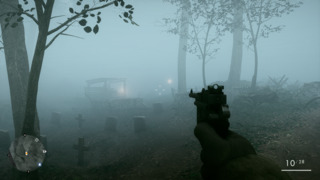
Battlefield 1 uses an anthology format where, much like in a horror anthology, the discrete nature of each story means characters can be killed off quickly without sabotaging the plot of later chapters. That's an indispensable tool when writing about military engagements, and the game needs to use multiple narratives for its remembrance as a war fought on a continental scale could never be summed up with a single soldier's journey. As the game divides up its story, so will we, as we describe each section in order.
Intro: Storm of Steel
This opening sequence features German units beating back the 369th Infantry across wartorn France. We play the 369th, which was a black regiment, and in the run-up to release of Battlefield 1, this brought out fervent racism in some corners of the gaming community. A select group of gamers claimed that the appearance of African-Americans in World War I was ahistorical despite the "Harlem Hellfighters" being a real infantry made up of African-Americans. Others thought black people were over-represented in the game, despite the 369th only showing up for ten to fifteen minutes, but being the troops that saw the most action in the real war. As with other controversies involving women and minorities in historical games, these detractors' reactions were not based on the facts but on a general feeling of who belonged where. In this case, a sense that all of western history before a vague cut-off date was white and male or should be depicted as such, but as Storm of Steel shows, that's inaccurate. We'll return to that point in Chapter 5.
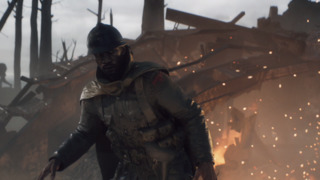
This intro is Battlefield 1 at its best, and that's down to it borrowing a page from Halo: Reach. The Battle of Reach is the most famous defeat of the fictional UNSC, Halo's "good guys". Bungie made the fight feel ultimately unwinnable by ending the campaign with a mission where you're met with infinite waves of bloodthirsty enemies, and once you die, the story is over for good. Storm of Steel chains together a sequence of these permadeath fights, and at the end of each one, displays a name and dates of service. It puts you in the mindset of someone who continues to keep a finger on the trigger even when death is certain, and when you do die, it's not a typical "video game death". There's no respawn, and you're not immediately prompted to start the game over with the same character; like true death, it's irreversible.
Chapter 1: Through Mud and Blood
The first full chapter is all about the tank and follows Daniel Edwards, the newest operator in a Mark V crew who are providing the big guns at the Battle of Cambrai. I understand the narrative utility of the tank. Survival in the war was predicated on soldiers' ability to communicate and strategise as a unit, and they were bonded by that cooperation. This machine is an easy way to push characters into a situation in which they must unify and make it clear to the audience what working together consists of. However, in this chapter, you never feel like you're controlling one soldier in the crew that must march to the beat of the others. Instead, it feels as though you take hold of every squad member at once, with the power to fire either gun, turn the tank, or repair it on a dime. And you go from the anxious vulnerability of that permadeath lead-in to rolling around in 29 tonnes of metal, armed with two booming cannons and four reliable machine guns. Battlefield 1 immediately abandons modelling the fragility of young men on the front lines to emulate the machinery of the time.
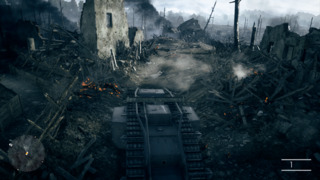
If you're going to speak on one technology that emerged from the First World War, you're right to choose the tank. It's a product of the then-recent industrial revolution, it intractably altered warfare, and it struck terror into troops on both sides. This stage also gets it right that the tank and plenty of other WWI implements were constantly breaking down. The chapter is a lot of your vehicle stopping and starting, and the shelling you take means that you have to repair Black Bess here to full constitution now and then which you can't do while treading mud. However, the fact that you can sit stationary, hold left bumper, and watch the landship heal from a smoking wreck to factory condition in about twenty seconds glosses over how arduous the repair job often was. You only become fully aware of the cost of the tank's instability near the end of the mission.
The Mark V goes belly up, leading Edwards to infiltrate three German camps to steal spark plugs for its engine. There's also a surprisingly beautiful moment where the tank is on the edge of caving in, and the characters' only hope is to send a carrier pigeon back to their allies with you controlling the bird. It's much more interesting than shooting your way out. The ending of the level also has a lot of potential, but a combination of too few cutscenes and a lack of humanising gameplay stops it short of being the gut punch it could be. After all that self-endangerment to procure the spark plugs, the tank survives for a single struggle over a small French village and then blows up anyway. An enemy soldier shoots one of your fellow crew members in the head which sounds sad, but the game doesn't even blink. You don't see the other characters' reactions, and inexplicably, the two surviving members of the crew literally walk off into the sunset. It's the game saying "Let's both agree to ignore that dead body and maybe we can tack a happy ending onto this thing".
Chapter 2: Friends in High Places
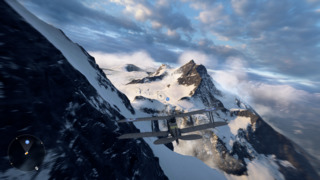
While Through Mud and Blood at least had the bones of a tearful war story, Friends in High Places feels plucked from a shelf of boy's own adventure books. In it, we play rapscallion Clyde Blackburn who steals the plane and identity of George Rackham, a son of the Earl of Windsor. With Rackham's co-pilot, Wilson, in tow, Blackburn goes on an aerial killing spree. The problems with the repair mechanic from the tank sections are only intensified when you're slouching in the cockpit of the prop plane. How you fully repair a plane in mid-air is beyond me, and you're not even required to stop to do it. You don't feel like a soldier with their life on the line; you feel like a wrathful dragon.
The chapter follows the same structure as the previous: we get a menacing vehicle, we lose it, and then it's returned to us for an eruptive finale. For Blackburn, that loss consists of having his plane shot down over no man's land where DICE impressively models an environment that both looks exactly like an artist's depiction of hell and yet is also completely believable. You drag Wilson through this inferno back to Rackham who prepares to court marshal you. The comedown from the giddy delirium of the blue skies combat to Blackburn internalising that he's a liar and a cheat is genuinely sobering.
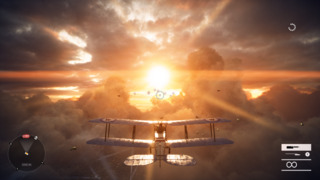
But then, as Blackburn's handcuffed to a ship in London, a storm of blitz planes rolls in, and as there's only one man for the job, we're right back in the dogfights again. Blackburn and Wilson crash land on a zeppelin and then our dashing hero runs across some scaffolding inside before commandeering its flak gun which he uses to ignite two other airships. The blimp he's standing on blows up, and he and Wilson jump into the River Thames. Blackburn ends the chapter by hinting that his version of events might be embellished, which of course it was. A soldier couldn't run over an intricate series of beams inside a balloon, and no blimp exploded outside the Houses of Parliament. The question isn't if Blackburn is lying; it's how much he is. It being plausible that none of this story happened is a testament to how far the game has gotten from following the history after just one full chapter. Friends in High Places couldn't care less about the lived experience of real soldiers; it just wants to use The Great War as a pretence for some Jack Sparrow-grade hijinks.
Chapter 3: Avanti Savoia!
We come back down to Earth when Italian veteran Luca Vincenzo Cocchiola tells his daughter the story of his service with the Arditi in the Dolomite Mountains. While the first two chapters represent the new vehicles The Great War produced, this one represents a new kind of soldier birthed from the war: the shock trooper. You do have a signature piece of equipment in this level, and it's your armour, but unlike the Mark V and the plane, this casing doesn't lend you any new abilities; it just increases your resistance to incoming bullets. Although, this protective clothing might be an anachronism. The Italian "Companies of Death" used armour, but I've not been able to find sources which peg it as an item of the Arditi's uniform. At any rate, Avanti Savoia! marks Battlefield 1's transition from technologically-enabled combat to conventional shooter play. The chapter starts as a slightly augmented on-foot FPS, and this time, when you lose your equipment, you don't see it again. Luca reaches a bottleneck where he must abandon his cumbersome plating and leave it in the dirt.
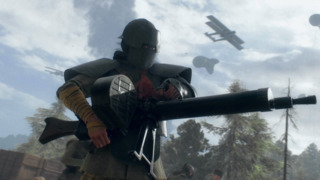
This level wins back some of the vulnerability that we saw in the opening. There's no shielding yourself with your tank chassis or flying away from a volley of rounds. If red hot gunfire soars your way, you have to take the hit, and even your defence against those shots is eventually downgraded. There's a harsh difficulty spike in here where, without your shining armour, you must face three brutal enemy offensives. First, you come to an area where imperial troops take the higher ground, and you have not much but sandbags and a tiny shack for cover. Next, you reach a wall of German emplacements where artillery gets the chance to shell you in open space, and troops can paint you into the corners of cramped trenches. Finally, you face the problem of enemies taking proximity and higher ground simultaneously, as you attempt to flush Germans from a fort on a hilltop. A couple of them even have their own armour.
But this difficulty spike supersizes the game's thematic issues. When you're losing more health to oncoming fire, you're spending more time hunkered behind walls waiting for it to recharge. It's a mechanic popularised, again, by Halo, but the Halo games were about being a literal supersoldier in power armour from the 26th century, and Battlefield tries to use mechanics created for that purpose to characterise a regular human pinned down by assault rifles and mortar rounds in 1918. While, in one way, you're exposed because a single misstep could lead you into the path of the bullet that kills you, in another way, you're invincible thanks to the recharging health, and infinite respawns. You might not notice that that was the case, but the strenuous difficulty means you're continually invoking those mechanics.
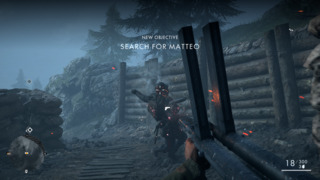
Once Storm of Steel has shown you what accurate death in a game would look like, there's no going back, and combat where you're popping back from the afterlife every few minutes doesn't feel like A Bridge Too Far, it feels like Groundhog Day. Not to mention, all these chapters cast you as a lone soldier for whom gunning down hundreds is all in a day's work. It breaks the illusion of the people in these squads being dependent on each other to live and further dissolves the idea that you're sensitive to the opposing armies. The ending, at least, plays out in the right key. Luca finds the brother he'd been searching for the whole chapter, Matteo, dead on the mountainside. The story closes suddenly, but that feels true to the shock and unpredictability that often came during the war, and unlike Through Mud and Blood, Avanti Savoia! gives us just enough time to see the anguish in the protagonist before it fades out.
Chapter 4: The Runner
The Runner completes Battlefield 1's transformation into a pure shooting gallery. It's not representing anything particularly new about the way war was fought after 1914, it's just the story of one soldier at that time. There are a few seconds at the start where we unload some ship cannons at a shoreline to shade in the last segment of Battlefield's land-air-sea trifecta, and there's a brief moment where we can fast-track through a village on horseback, but 95% of this level is us and a rifle. It also gets us thinking further afield in considering where World War I was fought and who by. There is a tendency among the UK public to reduce the whole conflict to battle by the British, Germans, and sometimes French in western Europe. But Avanti Savoia! expands our scope a little by having us play in Italy where one of the bloodiest struggles of the war took place, then The Runner pushes it a little further with an Australian man shooting his way through Gallipoli. Chapter 5 will lengthen our telescope to the Middle-East where we will play an Arab woman.
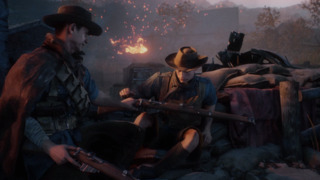
For now, let's keep our mind on legendary sharpshooter, Frederick Bishop, and his flustered apprentice, Jack Foster. Foster shows up out of the blue one day and is a little too bumbling to belong in this story, but effectively smuggles himself into The British Empire's fight against The Ottoman Empire, with Bishop acting as his reluctant protector. After an initial trench run that puts you directly in the line of cannon fire, the game rapidly descends from the difficulty spike we shot up in Avanti Savoia! An abundance of shotguns, plenty of alternate routes to skirt around enemies, and more breathing room in many areas made this a far easier level than the last. It gives it a lightness that's, again, detached from the terror that this war wrought and takes some wind out of the ending. When you can breeze through the level, you see Foster go from hopeless greenhorn to hardened warrior in the space of about thirty minutes, and it feels forced. By the end, the boy has learned to defend himself, but as Bishop is away capturing a fort from the Ottomans, he suffers what's likely a mortal wound, and a missile bombardment blows up the ship Foster is aboard.
Chapter 5: Nothing is Written
While we've seen new technologies and tactics figuring into the war in the previous episodes, Nothing is Written gives a short speech on how historical leaders provided a beacon for troops to rally around. Our first assault happens from the perspective of T.E. Lawrence, the real British Army officer famous for liaising with the rebels of the Arab Revolt. Taken together, chapter 4 and 5 collectively shine a light on how complex the web of alliances during WWI was.
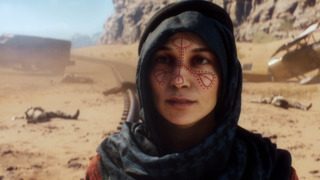
When the Australians attempt to wrest land from The Ottoman Empire, it might seem like classical colonial encroachment into a non-white nation. That's because it is. However, it's not as simple as there just being an oppressive society over here and an oppressed society over there. Because, while The British Empire was attempting to keep down The Ottomans, The Ottomans had conquered Arab land long ago and were persecuting the descendants of its natives. Furthermore, while The British Empire would generally persecute non-white people, in this case, they had a bigger fish to fry, and so, formed a partnership with the men and women of the Arab uprising to knock The Ottoman Empire off balance.
We play most of the level from behind the eyes of Zara Ghufran, a fictional student of Lawrence and one of the nomadic Bedouin people. She's a rare example of a playable Middle-Eastern woman who wasn't spat out of a character editor. She represents the last demographic a lot of Brits would associate with WWI, but there were Arab women who fought in this war, and every one of them was just as much a soldier as each of the European, American, or Oceanic troops. If all things were equal, you might expect Ghufran's existence to have triggered the same amount of bellyaching we got after we learned that the Harlem Hellfighters would appear in this game or that there would be women in the WWII-themed Battlefield V. But despite gaming reactionaries insisting that it's them and not the progressives who know the content of the games best, it seems that pushback against women and people of colour in the medium is far more about what's marketed than what the games contain.
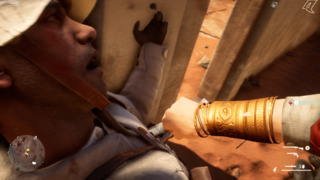
It's only natural that the chapter which features the greatest power imbalance between allies and enemies has to go last: you put your hardest level at the end of a game. The might of the Ottomans means that the Arabs have to retaliate with cunning strategy rather than just a bigger stick; that manifests in stealth becoming all but mandatory. The game always dangled the option to go in quiet in front of you, but the sheer quantity of imperial soldiers, the new mortar and sniper units, and the introduction of a silenced pistol mean that you'd now be a fool not to. And because you're spending time waiting for enemies to move into position and tracking marching routes, this level avoids the blink-and-miss-it pacing of The Runner.
Given that this is a war story, it feels like a foregone conclusion that it has to end in a field of corpses, but that's not where Battlefield 1 rests its head. The prestige of the level has Ghufran throwing mines, grenades, and whatever else she can get her hands on at an armoured train as mortars pelt the town around her. If you can relieve that train of all its health points, it goes up in a frenzy of fireballs. The story ends not in a whimper but a bang, and that moment right there tells you everything you need to know about Battlefield 1's priorities. The game has some inclination towards honouring the dead of The Great War, but when asked whether that matters more than the series' conventional pageantry of violence, it says "no" every time. Don't get me wrong, the destruction of the train and many other moments in this shooter look gorgeous, but this is the time of trench warfare; gorgeous shouldn't come into it.
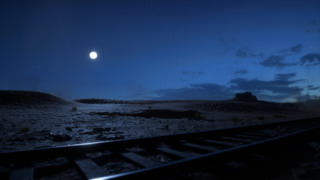
I can commend the stage for its epilogue text which tells us that the British reneged on their promise of Arab independence and that this conflict was part of the longrunning military campaign of the UK to extract oil from the Middle-East. These are both facts that make the British highly uncomfortable because they draw attention to not just historical imperialism on the part of our nation, but also modern imperialism. We can say we left the empire behind, but if we're still battling for oil in foreign countries, we're still pursuing imperialist methods and goals. However, most of the game's hard-hitting observations eek in through the text drops because there's little pathos in the play and cutscenes.
___
After you beat the game, you unlock a goodbye video; it includes a montage of the most action-packed beats of Battlefield 1 accompanied by a speech about how these soldiers will never be forgotten. It's ironic when Battlefield 1 so transparently doesn't care to remember what the First World War was. There is also, of course, the multiplayer where you can open a canister of mustard gas on an enemy soldier, rack up a cache of points, and then get shot in the head by someone with dog tags that say "SkullKillah420". Any memorial service would be lucky to have the same. In the month that followed the game's release, EA advertised it through some truly tasteless jokes. For example, one of their GIFs used an in-game depiction of a World War I soldier being burned to death along with the caption "When you're too hot for the club". Or there was Peter Moore's quip that "Trench warfare requires specialty equipment and clothing. Thus is born the Battlefield 1 onsie[sic], with pockets for melee weapons and Doritos".
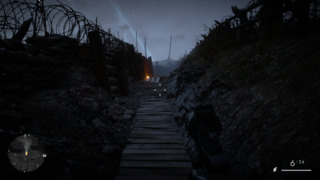
EA apologised for some of these statements. However, they do match this pattern of Battlefield 1 aiming to please a conventional gamer demographic above thinking about the humanity of WWI veterans. EA's press conference at E3 2017 featured a compilation of streamers giving thrilled reactions to in-game deaths of servicemen. It's amazing how there was no real change in tone between this presentation and the one on FIFA that followed. You would have thought WWI was escapist competition in the same sense a football match is. In one way, the centenary asked more respect for the victims of WWI than there had been in a long time. In another way, the size of the gap between 1918 and 2016 allowed EA and DICE to sensationalise the war without being told it was "too soon". If you want to make a game roughly set in the recent Afghan or Iraqi Wars, you at least change the name of the country you pick, and you don't try to depict any specific battles and political actors. However, when the war you're covering is long enough ago, there's this unwritten rule that it's fair to make a shooting gallery out of it.
The difference between memorialising and entertaining is that memorials are for those lost, and entertainment is for the audience. I want to return to that Peter Jackson documentary, They Shall Not Grow Old, because it's exemplary of how to choose the latter option over the former. In that film, the only speech comes from the writings of the soldiers, and that means that never does the director say something in the film for their own sake or the sake of the viewer. Everything spoken is what the soldiers of the war wanted to say. Battlefield 1, on the other hand, can be seen continually showboating for the audience. I don't think any of the problems with the game stem from a deliberate attempt by the developers to disrespect those who fought and suffered in the war it covers. From the way they talk, they always intended to develop a work that would honour the combatants, but they make creative choice after creative choice in the interests of the player and not of the wounded and dead.
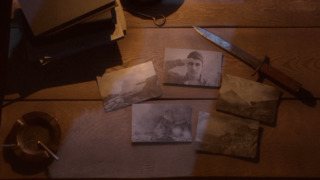
They use systems developed for empowerment fantasies to depict what's meant to be a harrowing and dispiriting experience, and I don't believe that a minute of wistful introduction and conclusion around thirty minutes of neck-slashing and machine-gun fire make for a respectful piece of media. To a film like They Shall Not Grow Old, The Great War is a disease that killed 6 million, all of them people like you or I. It says the event immortalises the soldiers who participated; hence the title of the documentary and their vivid depiction through its colourisation. But it also shows that immortalisation is haunting when you hear the horrors they were subject to. For Battlefield 1, The First World War is a container for picturesque vistas and the most sumptuous explosions possible. Maybe some soldiers died along the way, but those deaths just helped all-out war feel more epic. Thanks for reading.
Sources
Mougel N. (2011). World War I Casualties (Translator: J. Gratz).
All other sources are linked at relevant points in the article.
10 Comments